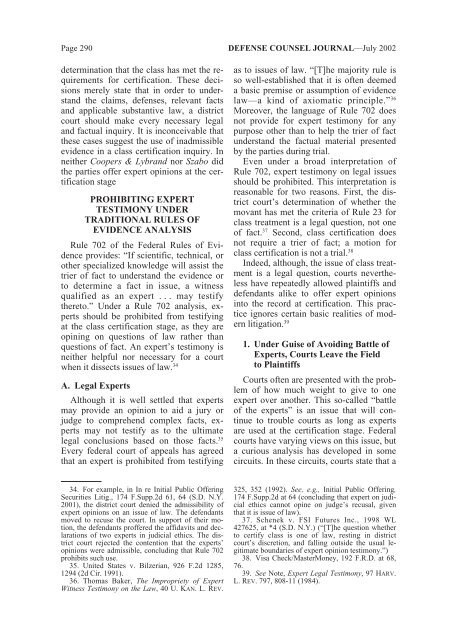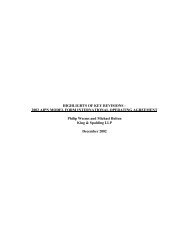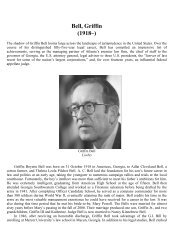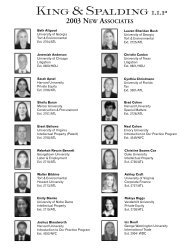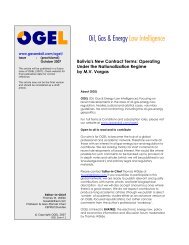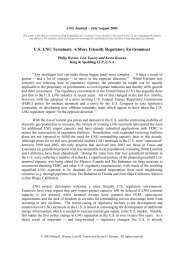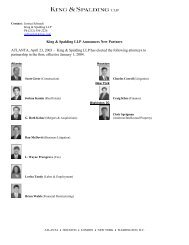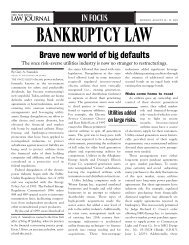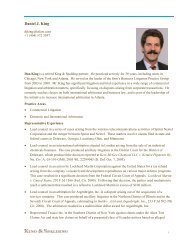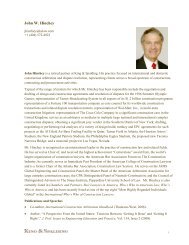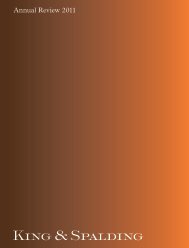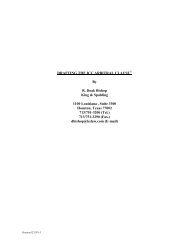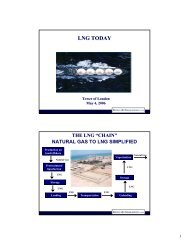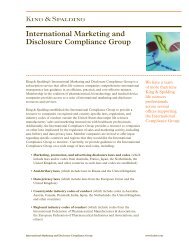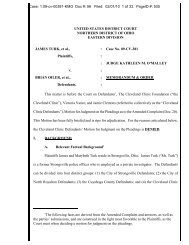Use and Misuse of Expert Opinions at the Class ... - King & Spalding
Use and Misuse of Expert Opinions at the Class ... - King & Spalding
Use and Misuse of Expert Opinions at the Class ... - King & Spalding
You also want an ePaper? Increase the reach of your titles
YUMPU automatically turns print PDFs into web optimized ePapers that Google loves.
Page 290 DEFENSE COUNSEL JOURNAL—July 2002<br />
determin<strong>at</strong>ion th<strong>at</strong> <strong>the</strong> class has met <strong>the</strong> requirements<br />
for certific<strong>at</strong>ion. These decisions<br />
merely st<strong>at</strong>e th<strong>at</strong> in order to underst<strong>and</strong><br />
<strong>the</strong> claims, defenses, relevant facts<br />
<strong>and</strong> applicable substantive law, a district<br />
court should make every necessary legal<br />
<strong>and</strong> factual inquiry. It is inconceivable th<strong>at</strong><br />
<strong>the</strong>se cases suggest <strong>the</strong> use <strong>of</strong> inadmissible<br />
evidence in a class certific<strong>at</strong>ion inquiry. In<br />
nei<strong>the</strong>r Coopers & Lybr<strong>and</strong> nor Szabo did<br />
<strong>the</strong> parties <strong>of</strong>fer expert opinions <strong>at</strong> <strong>the</strong> certific<strong>at</strong>ion<br />
stage<br />
PROHIBITING EXPERT<br />
TESTIMONY UNDER<br />
TRADITIONAL RULES OF<br />
EVIDENCE ANALYSIS<br />
Rule 702 <strong>of</strong> <strong>the</strong> Federal Rules <strong>of</strong> Evidence<br />
provides: “If scientific, technical, or<br />
o<strong>the</strong>r specialized knowledge will assist <strong>the</strong><br />
trier <strong>of</strong> fact to underst<strong>and</strong> <strong>the</strong> evidence or<br />
to determine a fact in issue, a witness<br />
qualified as an expert . . . may testify<br />
<strong>the</strong>reto.” Under a Rule 702 analysis, experts<br />
should be prohibited from testifying<br />
<strong>at</strong> <strong>the</strong> class certific<strong>at</strong>ion stage, as <strong>the</strong>y are<br />
opining on questions <strong>of</strong> law r<strong>at</strong>her than<br />
questions <strong>of</strong> fact. An expert’s testimony is<br />
nei<strong>the</strong>r helpful nor necessary for a court<br />
when it dissects issues <strong>of</strong> law. 34<br />
A. Legal <strong>Expert</strong>s<br />
Although it is well settled th<strong>at</strong> experts<br />
may provide an opinion to aid a jury or<br />
judge to comprehend complex facts, experts<br />
may not testify as to <strong>the</strong> ultim<strong>at</strong>e<br />
legal conclusions based on those facts. 35<br />
Every federal court <strong>of</strong> appeals has agreed<br />
th<strong>at</strong> an expert is prohibited from testifying<br />
as to issues <strong>of</strong> law. “[T]he majority rule is<br />
so well-established th<strong>at</strong> it is <strong>of</strong>ten deemed<br />
a basic premise or assumption <strong>of</strong> evidence<br />
law—a kind <strong>of</strong> axiom<strong>at</strong>ic principle.” 36<br />
Moreover, <strong>the</strong> language <strong>of</strong> Rule 702 does<br />
not provide for expert testimony for any<br />
purpose o<strong>the</strong>r than to help <strong>the</strong> trier <strong>of</strong> fact<br />
underst<strong>and</strong> <strong>the</strong> factual m<strong>at</strong>erial presented<br />
by <strong>the</strong> parties during trial.<br />
Even under a broad interpret<strong>at</strong>ion <strong>of</strong><br />
Rule 702, expert testimony on legal issues<br />
should be prohibited. This interpret<strong>at</strong>ion is<br />
reasonable for two reasons. First, <strong>the</strong> district<br />
court’s determin<strong>at</strong>ion <strong>of</strong> whe<strong>the</strong>r <strong>the</strong><br />
movant has met <strong>the</strong> criteria <strong>of</strong> Rule 23 for<br />
class tre<strong>at</strong>ment is a legal question, not one<br />
<strong>of</strong> fact. 37 Second, class certific<strong>at</strong>ion does<br />
not require a trier <strong>of</strong> fact; a motion for<br />
class certific<strong>at</strong>ion is not a trial. 38<br />
Indeed, although, <strong>the</strong> issue <strong>of</strong> class tre<strong>at</strong>ment<br />
is a legal question, courts never<strong>the</strong>less<br />
have repe<strong>at</strong>edly allowed plaintiffs <strong>and</strong><br />
defendants alike to <strong>of</strong>fer expert opinions<br />
into <strong>the</strong> record <strong>at</strong> certific<strong>at</strong>ion. This practice<br />
ignores certain basic realities <strong>of</strong> modern<br />
litig<strong>at</strong>ion. 39<br />
1. Under Guise <strong>of</strong> Avoiding B<strong>at</strong>tle <strong>of</strong><br />
<strong>Expert</strong>s, Courts Leave <strong>the</strong> Field<br />
to Plaintiffs<br />
Courts <strong>of</strong>ten are presented with <strong>the</strong> problem<br />
<strong>of</strong> how much weight to give to one<br />
expert over ano<strong>the</strong>r. This so-called “b<strong>at</strong>tle<br />
<strong>of</strong> <strong>the</strong> experts” is an issue th<strong>at</strong> will continue<br />
to trouble courts as long as experts<br />
are used <strong>at</strong> <strong>the</strong> certific<strong>at</strong>ion stage. Federal<br />
courts have varying views on this issue, but<br />
a curious analysis has developed in some<br />
circuits. In <strong>the</strong>se circuits, courts st<strong>at</strong>e th<strong>at</strong> a<br />
34. For example, in In re Initial Public Offering<br />
Securities Litig., 174 F.Supp.2d 61, 64 (S.D. N.Y.<br />
2001), <strong>the</strong> district court denied <strong>the</strong> admissibility <strong>of</strong><br />
expert opinions on an issue <strong>of</strong> law. The defendants<br />
moved to recuse <strong>the</strong> court. In support <strong>of</strong> <strong>the</strong>ir motion,<br />
<strong>the</strong> defendants pr<strong>of</strong>fered <strong>the</strong> affidavits <strong>and</strong> declar<strong>at</strong>ions<br />
<strong>of</strong> two experts in judicial ethics. The district<br />
court rejected <strong>the</strong> contention th<strong>at</strong> <strong>the</strong> experts’<br />
opinions were admissible, concluding th<strong>at</strong> Rule 702<br />
prohibits such use.<br />
35. United St<strong>at</strong>es v. Bilzerian, 926 F.2d 1285,<br />
1294 (2d Cir. 1991).<br />
36. Thomas Baker, The Impropriety <strong>of</strong> <strong>Expert</strong><br />
Witness Testimony on <strong>the</strong> Law, 40 U. KAN. L. REV.<br />
325, 352 (1992). See, e.g., Initial Public Offering,<br />
174 F.Supp.2d <strong>at</strong> 64 (concluding th<strong>at</strong> expert on judicial<br />
ethics cannot opine on judge’s recusal, given<br />
th<strong>at</strong> it is issue <strong>of</strong> law).<br />
37. Schenek v. FSI Futures Inc., 1998 WL<br />
427625, <strong>at</strong> *4 (S.D. N.Y.) (“[T]he question whe<strong>the</strong>r<br />
to certify class is one <strong>of</strong> law, resting in district<br />
court’s discretion, <strong>and</strong> falling outside <strong>the</strong> usual legitim<strong>at</strong>e<br />
boundaries <strong>of</strong> expert opinion testimony.”)<br />
38. Visa Check/MasterMoney, 192 F.R.D. <strong>at</strong> 68,<br />
76.<br />
39. See Note, <strong>Expert</strong> Legal Testimony, 97 HARV.<br />
L. REV. 797, 808-11 (1984).


